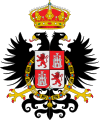Tunja
| Tunja | |||
|---|---|---|---|
| — City — | |||
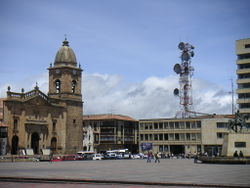 |
|||
|
|||
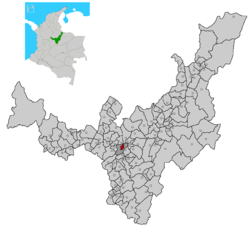 |
|||
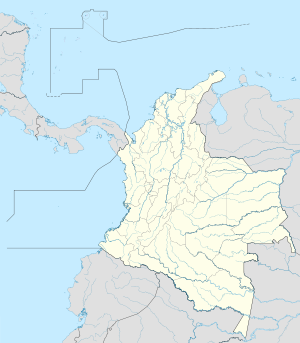 Tunja
|
|||
| Coordinates: | |||
| Country | |||
| Department | |||
| Province | Central Boyacá Province | ||
| Founded | August 6, 1539 | ||
| Established | March 29, 1541 | ||
| Government | |||
| - Type | Municipality | ||
| - Mayor (Alcalde) | Arturo Montejo | ||
| Area | |||
| - City | 118 km2 (45.6 sq mi) | ||
| - Urban | 13 km2 (5 sq mi) | ||
| Elevation | 2,810 m (9,219 ft) | ||
| Population (2005) | |||
| - City | 152,419 | ||
| - Density | 1,291.7/km2 (3,345.5/sq mi) | ||
| [1] | |||
| Website | tunja.gov.co | ||
Tunja (Spanish pronunciation: [ˈtuŋxa]) is a city and municipality located in the central part of Colombia, in the region of "Alto Chicomocha". As of the 2005 Census it had 152,419 inhabitants.[1] It is capital of the Department of Boyacá and part of the subregion of the Central Boyacá Province. It is approximately 115 km from Bogotá, the capital of Colombia, and takes about 2–3 hours to reach by car or bus. Tunja is known for being a center for education and is home to many Colegios (high schools) and Universidades (Universities). Founded in 1539 it is more than 450 years years old, and in addition holds archeological treasures that predate the colonial era.
Tunja is a tourist destination. In addition to its religious and historical sites it is host to several internationally known festivals and is a jumping off point for regional tourist destinations such as Villa de Leyva, Paipa, and Sierra Nevada del Cocuy. It is also a stop on the Pan American Highway which connects Tunja to Bogata and Santa Marta and eventually to Northern and Southern most parts of the Americas.
Contents |
Demographics and Geography
Tunja has a population of approximately 160,000 inhabitants and is located in north central Colombia. It has an elevation of 2.820 meters above sea level.
History
This Colombian historical city was founded on August 6, 1539 by the Spanish captain, Gonzalo Suarez Rendon, in the domain of "El Zaque", one of the chiefs of the Muiscas tribe.
The city was also the capital of the short lived state of the United Provinces of New Granada from 1810 to 1816.
Tunja is now a university city; one out of every five inhabitants is a student.
Tourism
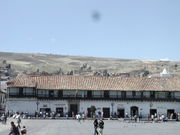
Plaza Bolivar
|
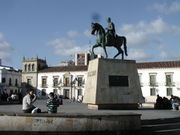
Plaza Bolivar
|
Relevant historical and touristic sites
- Altar of St. Ignatius Church built by the Jesuits.
- The church of Santo Domingo (known for its baroque architecture, unique in Latin America)
- The home of the founder
- The house of Juan de Castellanos
- The shaft or shaft Hunzaua Donato
- Santiago Metropolitan Cathedral Basilica of Tunja
- Plaza Bolivar
- Palacio de la Torre
- Casa Gustavo Rojas Pinilla
- Wall of the Martyrs
- Church of St. Ignatius
- Mono de la Pila
- Cerro de San Lazaro
- Finch Park
- Hope Park
- Old Market Square (Royal Plaza Mall)
- Rio de la Vega
- Church of Our Lady of Milagors (the Mole)
- The Church of Jesus Christ of Latter-day Saints (Near the forest of the Republic)
- Monuments to Columbus
- Cloister of St. Augustine (Library Alfonso Patiño Roselli)
- Forest of the Republic
- Santander Park
- Convento de Santa Clara la Real
- San Francisco Igleasia
- Altar of the Pelicans (Iglesia de San Francisco)
- Colegio de Boyaca (former cloister of the Society of Jesus)
Festivals
Churches
- The Church of Jesus Christ of Latter-day Saints
- Las Nieves
- The Mole
- La Fuente
- San Ignacio
- The Divine Child
- Seventh Day Adventist Church
- Santa Barbara
- Santo Domingo
- San Francisco
- San Laureano
- Evangelical Lutheran Church
- Santa Ana
- San Antonio
- Santa Clara
- San Martin
Shopping
Downtown
People have been shopping in downtown Tunja for over 450 years. There you can find gift shops, bakeries, bars, disco-techs, cafés, clothing stores, and much more.
- El Cid - an indoor shopping center with many small shops
- El Rey
- Teatro Boyacá
- Cinema Boyacá
- Unicentro
- Centro Norte
Shopping Malls
Unicentro is an American style shopping center that features a Carrefour and a Cinemark Theatres.
Traditional Markets
Plaza de Marcado del Norte Plaza de Marcado del Sur
Famous people
Josefa del Castillo y Guevara Gustavo Rojas Pinilla Jose Joaquin Ortiz Rafael Humberto Moreno Durán Pedro Alvarez Espinosa Carlos Arturo Torres Guillermo Prieto La Rotta
Education
Tunja well as being important historically, is also notable for his great contribution to education in Colombia, despite being a small town considered a large part of its population are students between high school and university. Tunja has a large number of colleges, among these is the College of Boyaca, first public school in the territories of Venezuela, Ecuador, Panama and Colombia when these countries were part of Gran Colombia. It was founded on 20 October 1822 by the Vice President Francisco de Paula Santander. Among the most relevant schools are:
- Colegio de Boyacá
- Institucion Educativa San Jeronimo Emiliani
- Colegio Salesiano Maldonado
- Colegio INEM Carlos Arturo Torres
- Colegio de la Presentación
- Gimnasio Campestre del Norte.
- Colegio Municipal Silvino Rodríguez
- Normal Superior Santiago de Tunja.
- Escuela Normal Femenina "Leonor Álvarez Pinzón"
- Colegio Los Angeles
- Colegio Militar Juan José Rondón
- Colegio de Nuestra Señora del Rosario
- Colegio Gustavo Rojas Pinilla.
- Colegio Andino
Universities
Tunja is the location of one of four national universities in the country, Pedagogical and Technological University of Colombia was founded by General Gustavo Rojas Pinilla. Other universities are:
- Universidad Pedagógica y Tecnológica de Colombia
- Universidad Santo Tomás
- Corporación Universitaria Remington(CUR-Cread Boyacá)
- Universidad Antonio Nariño
- Fundación Universitaria Juan de Castellanos
- Universidad de Boyacá (Uniboyacá)
- Universidad Pontificia Bolivariana de Colombia
- Instituto Universitario de la Música y las Artes
- Escuela Superior de Administración Pública E.S.A.P.
Sports
Overview of the Independence Stadium before the renovation. The city has two professional football teams. Boyaca Chico's playing in the Colombian Professional Football and Patriots of the Primera B. Both sets play their games at the Estadio La Independencia located north of the city. The stadium has one of the best Olympic country towns, the facilities were remodeled for the Copa Libertadores 2009, expanding capacity to 20,630 spectators and meeting every specification FIFA.4 The city organized in 2008 the South American U-20 Futsal which'm champion Brazil. Colombia was the fourth since the tournament continental.5
Sister cities
 Bogota, Colombia
Bogota, Colombia Florencia, Colombia
Florencia, Colombia Valledupar, Colombia
Valledupar, Colombia Guayaquil, Ecuador
Guayaquil, Ecuador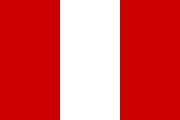 Juliaca, Peru
Juliaca, Peru Sucre, Bolivia
Sucre, Bolivia Cucuta, Colombia
Cucuta, Colombia Barcelona, Venezuela
Barcelona, Venezuela Corrientes, Argentina
Corrientes, Argentina
References
External links
- Tunja entry in Wikipedia Español
- Tunja Distrito Cultural y Turístico www.expotunja.com
- [1] City of Tunja Municipal Government
|
|||||||||||||||||||||||||||||||||||||||||||||||

